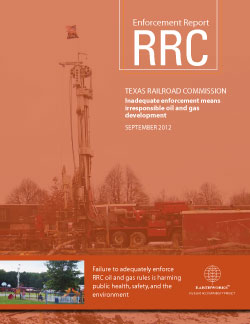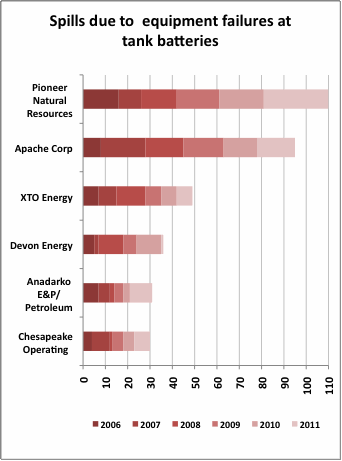Texas Oil & Gas Enforcement

The Railroad Commission of Texas (RRC) - the state agency with primary regulatory responsibility for the oil and natural gas industry - has the dual role of maximizing development of oil and gas while also protecting public safety and the environment.[1]
According to the Sunset Advisory Commission of Texas (“Sunset Commission”), “Unregulated production of oil and natural gas can detrimentally affect the environment and significantly hinder future product recovery efforts.”[2]
RRC data indicate that enforcement of oil and gas rules by the RRC is not keeping companies from damaging the environment. Between January 2006 and the end of 2011 there were more than 4,500 spills of crude oil and natural gas products. Close to six percent (266) of spills during this period affected water.[3]
Could enforcement efforts have prevented some of the spills? We looked a subset of spills to dig into this question. Spills occur at a variety of oil and gas facilities: tank batteries, pipelines, flowlines, valves, pump stations, and others.
We found that more than half of the spills (57%) between 2006 and 2011 occurred at tank batteries. Of the spills at tank batteries, some were probably not avoidable (e.g., caused by "Acts of God"). But close to half were caused by "equipment failure"[5], which presumably, with adequate maintenance and attention by the operator, may have been prevented.

Click chart for larger version
This chart shows that year after year, numerous operators have crude oil and natural gas product spills from tank batteries due to “equipment failures.” These types of spills often contaminate soils, create wastes that require proper disposal, and may contaminate water resources. Between 2006 and 2011, 45 spills caused by equipment failure at tank batteries affected water.[6]
As seen from the chart, between 2006 and 2011 six operators each had more than 30 incidents leading to crude oil and product spills at tank batteries. Pioneer Natural Resources had 29 spills in 2011 alone, and over the six-year period had 110 spills due to equipment failures at tank battery sites.[7]
The pattern of repeated problems at tank batteries strongly indicates that the RRC has not done enough to encourage or require companies to prevent pollution at these sites.
Overall, our review of publicly available RRC enforcement data shows that Texas RRC’s capacity to regulate the oil and gas industry has been, and remains, limited:
- Inspections are decreasing despite additional staff
- Violations remain high, and repeat offenders are not deterred by current enforcement actions
- Enforcement tools such as severances are not being used effectively
- Minimum and maximum penalties are too low to deter would-be violators
- RRC should increase transparency of enforcement data, and encourage greater citizen participation in enforcement
For more information:
- Earthworks: Enforcement Report - RRC: Public should not have confidence that oil and gas development is occurring responsibly in Texas. Report
- Earthworks: Texas Oil & Gas Enforcement. Web page
- Earthworks: Texas Oil & Gas Enforcement - Inspections. Web page
- Earthworks: Texas Oil & Gas Enforcement - Violations. Web page
- Earthworks: Texas Oil & Gas Enforcement - Enforcement Actions. Web page
- Earthworks: Texas Oil & Gas Enforcement - Public Participation. Web page
Endnotes
1 Texas Railroad Commission. June 18, 2010. Strategic Plan for the Fiscal Years 2011 to 2015. p. 16.
2 Sunset Advisory Commission. July 2011. Final Report - Railroad Commission of Texas. p. 12.
3 Crude oil/natural gas product spills in Texas (2006 - 2011).

Click chart for larger, footnoted version
4 There were 4,583 crude oil/natural gas product spills at Texas oil and gas facilities (see endnote 3) and 2,631 spills at tank batteries (see endnote 5). So tank battery spills comprised 57.4% of the total number of spills at all facilities.
5 Causes of crude oil/natural gas product spills at tank batteries in Texas (2006 - 2011).

Click chart for larger, footnoted version
6 Railroad Commission of Texas web site: “Crude Oil, Gas Well Liquids or Associated Products (H-8) Loss Reports.” Copied data for each year into a spreadsheet, then filtered by "Facility" = tank battery, “Cause of Loss” = Equipment failure. Counted number incidents where "Water" was something other than "None" (For example, creek, stock tank, pond, etc.).
7 Operators with most spills from equipment failure at tank batteries in Texas (2006 - 2011).

Click chart for larger, footnoted version
Tagged with: violations, texas, sanctions, regulations, penalties, inspections, fracking, fines, enforcement, drilling
Follow Earthworks